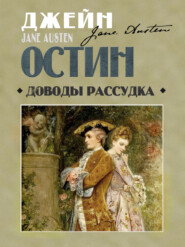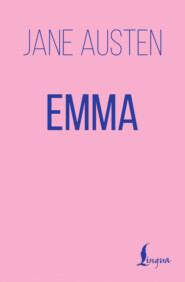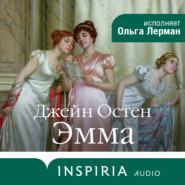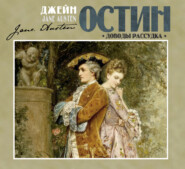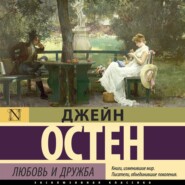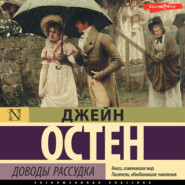По всем вопросам обращайтесь на: info@litportal.ru
(©) 2003-2024.
✖
Collins Classics
Автор
Год написания книги
2019
Настройки чтения
Размер шрифта
Высота строк
Поля
“My dear Madam, they can only raise the price of consumable articles by such an extraordinary demand for them and such a diffusion of money among us as must do us more good than harm. Our butchers and bakers and traders in general cannot get rich without bringing prosperity to us. If they do not gain, our rents must be insecure; and in proportion to their profit must be ours eventually in the increased value of our houses.”
“Oh! well. But I should not like to have butcher’s meat raised, though. And I shall keep it down as long as I can. Aye, that young lady smiles, I see. I dare say she thinks me an odd sort of creature; but she will come to care about such matters herself in time. Yes, yes, my dear, depend upon it, you will be thinking of the price of butcher’s meat in time, though you may not happen to have quite such a servants’ hall to feed as I have. And I do believe those are best off that have fewest servants. I am not a woman of parade as all the world knows, and if it was not for what I owe to poor Mr. Hollis’s memory, I should never keep up Sanditon House as I do. It is not for my own pleasure. Well, Mr. Parker, and the other is a boarding school, a French boarding school, is it? No harm in that. They’ll stay their six weeks. And out of such a number, who knows but some may be consumptive and want asses’ milk; and I have two milch asses at this present time. But perhaps the little Misses may hurt the furniture. I hope they will have a good sharp governess to look after them.”
Poor Mr. Parker got no more credit from Lady Denham than he had from his sisters for the object which had taken him to Willingden.
“Lord! my dear sir,” she cried. “How could you think of such a thing? I am very sorry you met with your accident, but upon my word, you deserved it. Going after a doctor! Why, what should we do with a doctor here? It would be only encouraging our servants and the poor to fancy themselves ill if there was a doctor at hand. Oh! pray, let us have none of the tribe at Sanditon. We go on very well as we are. There is the sea and the downs and my milch asses. And I have told Mrs. Whitby that if anybody inquires for a chamber-horse, they may be supplied at a fair rate—poor Mr. Hollis’s chamber-horse as good as new—and what can people want for more? Here have I lived seventy good years in the world and never took physic above twice and never saw the face of a doctor in all my life on my own account. And I verily believe if my poor dear Sir Harry had never seen one neither, he would have been alive now. Ten fees, one after another, did the man take who sent him out of the world. I beseech you Mr. Parker, no doctors here.”
The tea things were brought in.
“Oh, my dear Mrs. Parker—you should not indeed—why would you do so? I was just upon the point of wishing you good evening. But since you are so very neighbourly, I believe Miss Clara and I must stay.”
CHAPTER 7 (#ulink_c5d7d6b4-0df4-5e97-8399-ac7782adc83f)
The popularity of the Parkers brought them some visitors the very next morning; amongst them, Sir Edward Denham and his sister who, having been at Sanditon House, drove on to pay their compliments; and the duty of letter writing being accomplished, Charlotte was settled with Mrs. Parker in the drawing room in time to see them all. The Denhams were the only ones to excite particular attention. Charlotte was glad to complete her knowledge of the family by an introduction to them; and found them, the better half at least—for while single, the gentleman may sometimes be thought the better half of the pair—not unworthy of notice. Miss Denham was a fine young woman, but cold and reserved, giving the idea of one who felt her consequence with pride and her poverty with discontent, and who was immediately gnawed by the want of a handsomer equipage than the simple gig in which they travelled, and which their groom was leading about still in her sight. Sir Edward was much her superior in air and manner—certainly handsome, but yet more to be remarked for his very good address and wish of paying attention and giving pleasure. He came into the room remarkably well, talked much—and very much to Charlotte, by whom he chanced to be placed—and she soon perceived that he had a fine countenance, a most pleasing gentleness of voice and a great deal of conversation. She liked him. Sober-minded as she was, she thought him agreeable and did not quarrel with the suspicion of his finding her equally so, which would arise from his evidently disregarding his sister’s motion to go, and persisting in his station and his discourse. I make no apologies for my heroine’s vanity. If there are young ladies in the world at her time of life more dull of fancy and more careless of pleasing, I know them not and never wish to know them.
At last, from the low French windows of the drawing room which commanded the road and all the paths across the down, Charlotte and Sir Edward as they sat could not but observe Lady Denham and Miss Brereton walking by—and there was instantly a slight change in Sir Edward’s countenance—with an anxious glance after them as they proceeded—followed by an early proposal to his sister—not merely for moving, but for walking on together to the Terrace—which altogether gave a hasty turn to Charlotte’s fancy, cured her of her half-hour’s fever, and placed her in a more capable state of judging, when Sir Edward was gone, of how agreeable he had actually been. “Perhaps there was a good deal in his air and address; and his title did him no harm.”
She was very soon in his company again. The first object of the Parkers, when their house was cleared of morning visitors, was to get out themselves. The Terrace was the attraction to all. Everybody who walked must begin with the Terrace; and there, seated on one of the two green benches by the gravel walk, they found the united Denham party; but though united in the gross, very distinctly divided again—the two superior ladies being at one end of the bench, and Sir Edward and Miss Brereton at the other. Charlotte’s first glance told her that Sir Edward’s air was that of a lover. There could be no doubt of his devotion to Clara. How Clara received it was less obvious, but she was inclined to think not very favourably; for though sitting thus apart with him (which probably she might not have been able to prevent) her air was calm and grave.
That the young lady at the other end of the bench was doing penance was indubitable. The difference in Miss Denham’s countenance, the change from Miss Denham sitting in cold grandeur in Mrs. Parker’s drawing room, to be kept from silence by the efforts of others, to Miss Denham at Lady Denham’s elbow, listening and talking with smiling attention or solicitous eagerness, was very striking—and very amusing—or very melancholy, just as satire or morality might prevail. Miss Denham’s character was pretty well decided with Charlotte. Sir Edward’s required longer observation. He surprised her by quitting Clara immediately on their all joining and agreeing to walk, and by addressing his attentions entirely to herself.
Stationing himself close by her, he seemed to mean to detach her as much as possible from the rest of the party and to give her the whole of his conversation. He began, in a tone of great taste and feeling, to talk of the sea and the sea shore; and ran with energy through all the usual phrases employed in praise of their sublimity and descriptive of the undescribable emotions they excite in the mind of sensibility. The terrific grandeur of the ocean in a storm, its glass surface in a calm, its gulls and its samphire and the deep fathoms of its abysses, its quick vicissitudes, its direful deceptions, its mariners tempting it in sunshine and overwhelmed by the sudden tempest, all were eagerly and fluently touched—rather commonplace perhaps, but doing very well from the lips of a handsome Sir Edward—and she could not but think him a man of feeling—till he began to stagger her by the number of his quotations and the bewilderment of some of his sentences.
“Do you remember,” said he, “Scott’s beautiful lines on the sea? Oh! what a description they convey! They are never out of my thoughts when I walk here. That man who can read them unmoved must have the nerves of an assassin! Heaven defend me from meeting such a man unarmed.”
“What description do you mean?” said Charlotte. “I remember none at this moment, of the sea, in either of Scott’s poems.”
“Do you not indeed? Nor can I exactly recall the beginning at this moment. But you cannot have forgotten his description of woman—
‘Oh! Woman in our hours of ease—’
“Delicious! Delicious! Had he written nothing more, he would have been immortal. And then again, that unequalled, unrivalled address to parental affection—
‘Some feelings are to mortals given With less of earth in them than heaven’ etc.
“But while we are on the subject of poetry, what think you, Miss Heywood, of Burns’s lines to his Mary? Oh! there is pathos to madden one! If ever there was a man who felt, it was Burns. Montgomery has all the fire of poetry, Wordsworth has the true soul of it, Campbell in his pleasures of hope has touched the extreme of our sensations—‘Like angel’s visits, few and far between.’ Can you conceive anything more subduing, more melting, more fraught with the deep sublime than that line? But Burns—I confess my sense of his pre-eminence, Miss Heywood. If Scott has a fault, it is the want of passion. Tender, elegant, descriptive but tame. The man who cannot do justice to the attributes of woman is my contempt. Sometimes indeed a flash of feeling seems to irradiate him, as in the lines we were speaking of—‘Oh. Woman in our hours of ease’—. But Burns is always on fire. His soul was the altar in which lovely woman sat enshrined, his spirit truly breathed the immortal incense which is her due.”
“I have read several of Burns’s poems with great delight,” said Charlotte as soon as she had time to speak. “But I am not poetic enough to separate a man’s poetry entirely from his character; and poor Burns’s known irregularities greatly interrupt my enjoyment of his lines. I have difficulty in depending on the truth of his feelings as a lover. I have not faith in the sincerity of the affections of a man of his description. He felt and he wrote and he forgot.”
“Oh! no, no,” exclaimed Sir Edward in an ecstasy. “He was all ardour and truth! His genius and his susceptibilities might lead him into some aberrations but who is perfect? It were hyper-criticism, it were pseudo-philosophy to expect from the soul of high-toned genius the grovellings of a common mind. The coruscations of talent, elicited by impassioned feeling in the breast of man, are perhaps incompatible with some of the prosaic decencies of life; nor can you, loveliest Miss Heywood,” speaking with an air of deep sentiment, “nor can any woman be a fair judge of what a man may be propelled to say, write or do by the sovereign impulses of illimitable ardour.”
This was very fine, but if Charlotte understood it at all, not very moral; and being moreover by no means pleased with his extraordinary style of compliment, she gravely answered, “I really know nothing of the matter. This is a charming day. The wind, I fancy, must be southerly.”
“Happy, happy wind, to engage Miss Heywood’s thoughts!”
She began to think him downright silly. His choosing to walk with her, she had learnt to understand. It was done to pique Miss Brereton. She had read it, in an anxious glance or two on his side; but why he should talk so much nonsense, unless he could do no better, was unintelligible. He seemed very sentimental, very full of some feeling or other, and very much addicted to all the newest-fashioned hard words, had not a very clear brain, she presumed, and talked a good deal by rote. The future might explain him further. But when there was a proposition for going into the library, she felt that she had had quite enough of Sir Edward for one morning and very gladly accepted Lady Denham’s invitation of remaining on the Terrace with her.
The others all left them, Sir Edward with looks of very gallant despair in tearing himself away, and they united their agreeableness—that is, Lady Denham, like a true great lady, talked and talked only of her own concerns, and Charlotte listened, amused in considering the contrast between her two companions. Certainly there was no strain of doubtful sentiment nor any phrase of difficult interpretation in Lady Denham’s discourse. Taking hold of Charlotte’s arm with the ease of one who felt that any notice from her was an honour, and communicative from the influence of the same conscious importance or a natural love of talking, she immediately said in a tone of great satisfaction and with a look of arch sagacity, “Miss Esther wants me to invite her and her brother to spend a week with me at Sanditon House, as I did last summer. But I shan’t. She has been trying to get round me every way with her praise of this and her praise of that; but I saw what she was about. I saw through it all. I am not very easily taken in, my dear.”
Charlotte could think of nothing more harmless to be said than the simple enquiry of “Sir Edward and Miss Denham?”
“Yes, my dear. My young folks, as I call them sometimes, for I take them very much by the hand. I had them with me last summer, about this time, for a week; from Monday to Monday; and very delighted and thankful they were. For they are very good young people, my dear. I would not have you think that I only notice them for poor dear Sir Harry’s sake. No, no; they are very deserving themselves or, trust me, they would not be so much in my company. I am not the woman to help anybody blindfold. I always take care to know what I am about and who I have to deal with before I stir a finger. I do not think I was ever over-reached in my life. And that is a good deal for a woman to say that has been married twice. Poor dear Sir Harry, between ourselves, thought at first to have got more. But, with a bit of a sigh, he is gone, and we must not find fault with the dead. Nobody could live happier together than us and he was a very honourable man, quite the gentleman of ancient family. And when he died, I gave Sir Edward his gold watch.”
She said this with a look at her companion which implied its right to produce a great impression; and seeing no rapturous astonishment in Charlotte’s countenance, added quickly, “He did not bequeath it to his nephew, my dear. It was no bequest. It was not in the will. He only told me, and that but once, that he should wish his nephew to have his watch; but it need not have been binding if I had not chose it.”
“Very kind indeed! Very handsome!” said Charlotte, absolutely forced to affect admiration.
“Yes, my dear, and it is not the only kind thing I have done by him. I have been a very liberal friend to Sir Edward. And poor young man, he needs it bad enough. For though I am only the dowager, my dear, and he is the heir, things do not stand between us in the way they commonly do between those two parties. Not a shilling do I receive from the Denham estate. Sir Edward has no payments to make me. He don’t stand uppermost, believe me. It is I that help him.”
“Indeed! He is a very fine young man, particularly elegant in his address.”
This was said chiefly for the sake of saying something, but Charlotte directly saw that it was laying her open to suspicion by Lady Denham’s giving a shrewd glance at her and replying, “Yes, yes, he is very well to look at. And it is to be hoped that some lady of large fortune will think so, for Sir Edward must marry for money. He and I often talk that matter over. A handsome young fellow like him will go smirking and smiling about and paying girls compliments, but he knows he must marry for money. And Sir Edward is a very steady young man in the main and has got very good notions.
“Sir Edward Denham,” said Charlotte, “with such personal advantages may be almost sure of getting a woman of fortune, if he chooses it.”
This glorious sentiment seemed quite to remove suspicion.
“Aye my dear, that’s very sensibly said,” cried Lady Denham. “And if we could but get a young heiress to Sanditon! But heiresses are monstrous scarce! I do not think we have had an heiress here or even a co-heiress since Sanditon has been a public place. Families come after families but, as far as I can learn, it is not one in a hundred of them that have any real property, landed or funded. An income perhaps, but no property. Clergymen maybe, or lawyers from town, or half-pay officers, or widows with only a jointure. And what good can such people do anybody?—except just as they take our empty houses and, between ourselves, I think they are great fools for not staying at home. Now if we could get a young heiress to be sent here for her health and if she was ordered to drink asses’ milk I could supply her and, as soon as she got well, have her fall in love with Sir Edward!”
“That would be very fortunate indeed.”
“And Miss Esther must marry somebody of fortune too. She must get a rich husband. Ah, young ladies that have no money are very much to be pitied! But,” after a short pause, “if Miss Esther thinks to talk me into inviting them to come and stay at Sanditon House, she will find herself mistaken. Matters are altered with me since last summer, you know. I have Miss Clara with me now which makes a great difference.”
She spoke this so seriously that Charlotte instantly saw in it the evidence of real penetration and prepared for some fuller remarks; but it was followed only by, “I have no fancy for having my house as full as an hotel. I should not choose to have my two housemaids’ time taken up all the morning in dusting out bed-rooms. They have Miss Clara’s room to put to rights as well as my own every day. If they had hard places, they would want higher wages.”
For objections of this nature, Charlotte was not prepared. She found it so impossible even to affect sympathy that she could say nothing. Lady Denham soon added, with great glee, “And besides all this, my dear, am I to be filling my house to the prejudice of Sanditon? If people want to be by the sea, why don’t they take lodgings? Here are a great many empty houses—three on this very Terrace—no fewer than three lodging papers staring me in the face at this very moment, Numbers three, four and eight. Eight, the corner house, may be too large for them, but either of the two others are nice little snug houses, very fit for a young gentleman and his sister. And so, my dear, the next time Miss Esther begins talking about the dampness of Denham park and the good bathing always does her, I shall advise them to come and take one of these lodgings for a fortnight. Don’t you think that will be very fair? Charity begins at home, you know.”
Charlotte’s feelings were divided between amusement and indignation—but indignation had the larger and the increasing share. She kept her countenance and she kept a civil silence. She could not carry her forbearance farther; but without attempting to listen longer, and only conscious that Lady Denham was still talking on in the same way, allowed her thoughts to form themselves into such a meditation as this:
“She is thoroughly mean. I had not expected anything so bad. Mr. Parker spoke too mildly of her. His judgement is evidently not to be trusted. His own good nature misleads him. He is too kind-hearted to see clearly. I must judge for myself. And their very connection prejudices him. He has persuaded her to engage in the same speculation, and because their object in that line is the same, he fancies she feels like him in others. But she is very, very mean. I can see no good in her. Poor Miss Brereton! And she makes everybody mean about her. This poor Sir Edward and his sister—how far nature meant them to be respectable I cannot tell—but they are obliged to be mean in their servility to her. And I am mean, too, in giving her my attention with the appearance of coinciding with her. Thus it is, when rich people are sordid.”
CHAPTER 8 (#ulink_7967cec8-85bd-51f3-8981-e70626c0e580)
The two ladies continued walking together till rejoined by the others, who, as they issued from the library, were followed by a young Whitby running off with five volumes under his arm to Sir Edward’s gig; and Sir Edward, approaching Charlotte, said, “You may perceive what has been our occupation. My sister wanted my counsel in the selection of some books. We have many leisure hours and read a great deal. I am no indiscriminate novel reader. The mere trash of the common circulating library I hold in the highest contempt. You will never hear me advocating those puerile emanations which detail nothing but discordant principles incapable of amalgamation, or those vapid tissues of ordinary occurrences, from which no useful deductions can be drawn. In vain may we put them into a literary alembic; we distil nothing which can add to science. You understand me, I am sure?”
“I am not quite certain that I do. But if you will describe the sort of novels which you do approve, I dare say it will give me a clearer idea.”
“Most willingly, fair questioner. The novels which I approve are such as display human nature with grandeur; such as show her in the sublimities of intense feeling; such as exhibit the progress of strong passion from the first germ of incipient susceptibility to the utmost energies of reason half-dethroned—where we see the strong spark of woman’s captivations elicit such fire in the soul of man as leads him—though at the risk of some aberration—from the strict line of primitive obligations to hazard all, dare all, achieve all to obtain her. Such are the works which I peruse with delight and, I hope I may say, with amelioration. They hold forth the most splendid portraitures of high conceptions, unbounded views, illimitable ardour, indomitable decision. And even when the event is mainly anti-prosperous to the high-toned machinations of the prime character, the potent, pervading hero of the story, it leaves us full of generous emotions for him; our hearts are paralysed. T’were pseudo-philosophy to assert that we do not feel more enwrapped by the brilliancy of his career than by the tranquil and morbid virtues of any opposing character. Our approbation of the latter is but eleemosynary. These are the novels which enlarge the primitive capabilities of the heart; and which it cannot impugn the sense or be any dereliction of the character of the most anti-puerile man, to be conversant with.”
“If I understand you aright,” said Charlotte, “our taste in novels is not at all the same.”
And here they were obliged to part, Miss Denham being much too tired of them all to stay any longer.
The truth was that Sir Edward, whom circumstances had confined very much to one spot, had read more sentimental novels than agreed with him. His fancy had been early caught by all the impassioned and most exceptionable parts of Richardson’s, and such authors as had since appeared to tread in Richardson’s steps, so far as man’s determined pursuit of woman in defiance of every opposition of feeling and convenience was concerned, had since occupied the greater part of his literary hours, and formed his character. With a perversity of judgement which must be attributed to his not having by nature a very strong head, the graces, the spirit, the sagacity and the perseverance of the villain of the story out-weighed all his absurdities and all his atrocities with Sir Edward. With him such conduct was genius, fire and feeling. It interested and inflamed him. And he was always more anxious for its success, and mourned over its discomfitures with more tenderness, than could ever have been contemplated by the authors.
Though he owed many of his ideas to this sort of reading, it would be unjust to say that he read nothing else or that his language was not formed on a more general knowledge of modern literature. He read all the essays, letters, tours and criticisms of the day; and with the same ill-luck which made him derive only false principles from lessons of morality, and incentives to vice from the history of its overthrow, he gathered only hard words and involved sentences from the style of our most approved writers.
Sir Edward’s great object in life was to be seductive. With such personal advantages as he knew himself to possess, and such talents as he did also give himself credit for, he regarded it as his duty. He felt that he was formed to be a dangerous man, quite in the line of the Lovelaces. The very name of Sir Edward, he thought, carried some degree of fascination with it. To be generally gallant and assiduous about the fair, to make fine speeches to every pretty girl, was but the inferior part of the character he had to play. Miss Heywood, or any other young woman with any pretensions to beauty, he was entitled (according to his own view of society) to approach with high compliment and rhapsody on the slightest acquaintance. But it was Clara alone on whom he had serious designs; it was Clara whom he meant to seduce.






